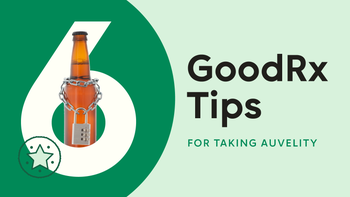
What to Know About Auvelity, A Fast-Acting Pill for Depression
Key takeaways:
In August 2022, the FDA approved Auvelity (dextromethorphan / bupropion) to treat depression in adults. It’s an oral medication that works differently than other antidepressants.
Most oral antidepressants need about 4 to 8 weeks (1 to 2 months) before their full benefits kick in. Auvelity appears to be effective after 1 week.
There are ways to save on Auvelity. If you’re eligible, a manufacturer savings card can help you access Auvelity for as little as $10 per prescription.
Access savings on related medications
Table of contents

Living with depression is a personal experience. Symptoms can vary for everyone, and the way it affects your life can be hard to explain. As such, there are many ways to treat depression, ranging from therapy and medications to complementary treatments.
If you take medication for depression, you may take a selective serotonin reuptake inhibitor (SSRI). These popular oral antidepressants include medications such as sertraline (Zoloft), escitalopram (Lexapro), and fluoxetine (Prozac). And while they’re beneficial for many people, it can take a while before you notice their mood-enhancing effects.
For people looking for another treatment option, Auvelity (dextromethorphan / bupropion) may be your answer. It’s not like other antidepressants, and it can help improve mood in a shorter amount of time. But since Auvelity was approved more recently than traditional antidepressants, you may have a few questions about how it works.



What is Auvelity used for?
Auvelity is a prescription-only, oral antidepressant medication. It’s FDA approved to treat major depressive disorder (depression) in adults. It comes as an extended-release (ER) tablet that combines two medications together: dextromethorphan and bupropion.
This combination of medications appeared to be a high priority on the FDA’s to-do list. Prior to its approval, the FDA gave Auvelity its breakthrough therapy designation. They also evaluated the medication with priority review.
Auvelity is made by Axsome Therapeutics, a U.S. pharmaceutical company.
What makes Auvelity different from other antidepressants?
Many oral antidepressants take 4 to 8 weeks (1 to 2 months) to start working, although some symptoms may improve after 1 to 2 weeks. Medications like Spravato (esketamine) nasal spray start working faster, but they’re administered by a healthcare professional. Spravato is also used specifically for depression that hasn’t responded well to other treatments.
By comparison, Auvelity is a fast-acting oral antidepressant. It’s the first and only oral antidepressant that’s effective in as little as 1 week. And unlike other fast-acting treatments, you can take it at home.
How does Auvelity work?
Auvelity has two active ingredients: dextromethorphan and bupropion. And they’re thought to work in a few ways.
Auvelity (dextromethorphan / bupropion) vs. Spravato (esketamine): These are both fast-acting antidepressants, but they aren’t one and the same. This is what makes them unique.
Auvelity dosages: Find out how much Auvelity you should take and when you should take it.
Managing side effects: Auvelity is well tolerated, but it can cause side effects such as dizziness and upset stomach. Read on to discover other Auvelity side effects.
Dextromethorphan affects two types of receptors (chemical binding sites) in your brain. It blocks receptors called N-methyl-D-aspartate (NMDA) receptors, but it activates sigma-1 receptors. This helps glutamate and monoamine chemical messengers become more active and available in your brain. It’s thought that this helps contribute to positive changes in mood.
Bupropion helps support dextromethorphan’s efforts. It gets in the way of an enzyme (protein) that breaks down dextromethorphan. By doing this, dextromethorphan lasts longer in your body. This helps make it more effective. Bupropion may also affect chemical messengers like norepinephrine and dopamine.
Auvelity isn’t an SSRI or serotonin and norepinephrine reuptake inhibitor (SNRI).
Auvelity dosages: How is Auvelity taken?
During your first 3 days of taking Auvelity, you’ll likely take one tablet by mouth daily. This helps your body get used to the medication. From that point on, it’s recommended to take 1 tablet by mouth 2 times daily, at least 8 hours apart. You can take your doses with or without food, but you shouldn’t split, crush, or chew the tablets.
Each Auvelity tablet contains 45 mg of dextromethorphan and 105 mg of bupropion.
Keep in mind: Depending on your kidney health and other medications you take, your healthcare professional may only want you to take 1 tablet per day. Make sure they have an updated list of all medications and supplements that you take.
How effective is Auvelity when treating depression?
Most of what we know about Auvelity’s effectiveness comes from two clinical trials, GEMINI and ASCEND.
In the GEMINI study, Auvelity was compared to placebo (a tablet with no medication in it). After 1 week, people taking Auvelity reported significantly improved depression symptoms compared to placebo. This was also the case after 6 weeks.
In the ASCEND study, researchers compared Auvelity to bupropion sustained-release (Wellbutrin SR). After 6 weeks, Auvelity was significantly better than bupropion SR at improving depression symptoms.
What are the common side effects of Auvelity?
All medications can cause side effects, including Auvelity. These side effects happened to 5% or more of people in Auvelity’s clinical trials:
Dizziness
Nausea
Headache
Drowsiness
Diarrhea
Sexual dysfunction, including erectile dysfunction, orgasm changes, and a lower sex drive
More sweating than usual
Serious Auvelity side effects
They’re less common, but Auvelity does have a few serious side effects to be aware of.
All antidepressants, including Auvelity, have a boxed warning about a risk for suicidal thoughts and behaviors. This is the FDA’s most serious type of medication warning. This risk is more common in people younger than age 25 and during the first few months of taking Auvelity. Contact your healthcare professional right away if you have any sudden changes in thoughts or behavior.
Other serious risks are also possible, including:
High blood pressure
Mental health changes, including mania (high energy levels), hallucinations, and confusion
Certain eye complications
Possible harm to a fetus (when taken during pregnancy)
If you or a loved one are experiencing symptoms like these, reach out to your healthcare professional right away. And if your symptoms feel severe, it’s better to seek immediate medical attention.
What medications interact with Auvelity?
Like other antidepressants, Auvelity has a number of drug interactions to keep in mind.
If you take any of these medications with Auvelity, your prescriber and pharmacist may want to adjust your medication doses and/or warn you about an increased risk of side effects:
Over-the-counter dextromethorphan (or dextromethorphan-containing products)
Monoamine oxidase inhibitors (MAOIs), such as selegiline (Zelapar, Emsam) or phenelzine (Nardil)
Medications that affect serotonin levels, such as triptan migraine medications and many antidepressants
Medications that worsen the risk for seizures, such as tramadol (ConZip)
Medications that make Auvelity last longer in your body, such as fluoxetine, paroxetine (Paxil), or mirabegron (Myrbetriq)
Medications that make Auvelity less effective, such as phenobarbital
Medications that raise dopamine levels in your body, such as carbidopa / levodopa (Sinemet)
Digoxin
This isn’t a complete list of possible interactions. To help prevent Auvelity interactions, make sure your prescriber and pharmacist have an updated list of medications and supplements that you take.
How to save on Auvelity
The average retail price for a 30-day supply is $1410.33. There are ways to save on Auvelity, though, which is available as a brand-name medication. GoodRx can help you navigate ways to save money on your prescription.
Save with a copay savings card: If you have commercial insurance, you may be eligible to pay as little as $10 for a 30- to 90-day supply of Auvelity using a savings card from the manufacturer.
Use a mail-order pharmacy: If you use Auvelity’s preferred mail-order pharmacy, you may be able to pay as little as $0 for the medication.
Save with GoodRx: GoodRx can help you save over 15% off the average retail price of Auvelity at certain pharmacies.
Frequently asked questions
Auvelity isn’t typically prescribed to treat anxiety. Not much evidence is available to support this use. Some early data suggests that Auvelity can lessen anxiety associated with depression, but more studies are needed to confirm this. A small number of people in Auvelity’s initial studies also experienced anxiety as a side effect.
Auvelity may increase energy levels in some people. This is likely due to the bupropion portion of the medication and how it affects certain chemical messengers in your brain. Improved energy levels are also a sign that Auvelity is working to ease your depression symptoms.
However, if you have racing thoughts or are feeling overly excited compared to normal, these could be symptoms of a manic episode — especially in people with bipolar disorder. Tell your healthcare professional about any notable changes in energy or mood while taking Auvelity.
The bottom line
Auvelity (dextromethorphan / bupropion) is a fast-acting antidepressant that treats depression in adults. It combines dextromethorphan and bupropion into a single pill. It may be effective in as little as 1 week, which is faster than other oral antidepressants. But it has a number of risks and side effects to keep in mind. For more information about Auvelity, make sure to ask a healthcare professional.
Why trust our experts?


References
Axsome Therapeutics. (2022). Auvelity—the first and only oral NMDA receptor antagonist for MDD.
Axsome Therapeutics. (2022). Axsome Therapeutics announces FDA approval of AUVELITY, the first and only oral NMDA receptor antagonist for the treatment of major depressive disorder in adults. GlobeNewswire.
Axsome Therapeutics. (2024). Auvelity- dextromethorphan hydrobromide, bupropion hydrochloride tablet, multilayer, extended release [package insert]. DailyMed.
Endocrine Society. (2022). Adrenal hormones.
Iosifescu, D. V., et al. (2022). Efficacy and safety of AXS-05 (dextromethorphan-bupropion) in patients with major depressive disorder: A phase 3 randomized clinical trial (GEMINI). The Journal of Clinical Psychiatry.
Jones, A., et al. (2023). Improvement in anxiety symptoms in depressed patients treated with AXS-05 (dextromethorphan-bupropion): Results from the Evolve open-label, long-term study. CNS Spectrums.
National Center for Complementary and Integrative Health. (2021). Depression and complementary health approaches: What the science says. NCCIH Clinical Digest for Health Professionals.
Patel, K., et al. (2016). Bupropion: A systematic review and meta-analysis of effectiveness as an antidepressant. Therapeutic Advances in Psychopharmacology.
Tabuteau, H., et al. (2022). Effect of AXS-05 (dextromethorphan-bupropion) in major depressive disorder: A randomized double-blind controlled trial. The American Journal of Psychiatry.
Was this page helpful?
Related Articles
Browse medications
View AllResearch prescriptions and over-the-counter medications from A to Z, compare drug prices, and start saving.







